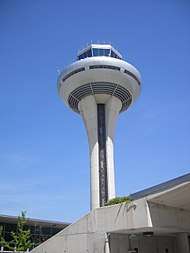Spanish air traffic controllers strike
The Spanish air traffic controllers strike began on December 3, 2010 when most air traffic controllers in Spanish airports were exceeding the total number of hours that they were allowed to work in a year by law. Although this was known by the Spanish Government and many formal complaints were forwarded from USCA (main air traffic controllers Spanish union), the Spanish Government took action and declared rate 0 (no air movements) to avoid having controllers exceeding the work hours. On the following morning a royal decree to impose martial law over the civil air traffic controllers was declared, hence the mentioned maximum working hours would not apply. Operations in a total of eight airports, including the country's two main airports, Madrid-Barajas and Barcelona-El Prat[1] were supervised by military forces, however the control was still exercised by the same air traffic controllers.

The move by controllers came after a year of dispute with the government and the Spanish airport authority Aena over working conditions, work schedules and benefits. According to some sources,[2] air traffic controllers could earn up to 350,000 euros per annum, a claim that has been hotly disputed.[3] This has meant that the controllers have not received much sympathy on this dispute in Spain. On the same day of imposing martial law, the Spanish Council of Ministers approved plans to partially privatise Aena.[1]
The use of emergency powers was the first time since the restoration of democracy in 1975 that a state of alert had been called[2] and created a perfect cover up by the Spanish Government to change working conditions and benefits on air traffic controllers unilaterally. Under the measure, controllers were escorted by armed guards and faced arrest for the crime of disobedience, stipulated in the Spanish military penal code in case of not showing up at work.[4] Some controllers reported to have been forced to work at gunpoint.[5]
The use of this measure by the Spanish government has been severely criticised by ATCEUC (Air Traffic Controllers European Unions Coordination) through a press release.[6]
References
- "Spanish airports reopen after strike causes holiday chaos". guardian.co.uk. December 4, 2010. Retrieved 2010-12-05.
- "Striking Spain air traffic controllers return to work". BBC. 4 December 2010. Retrieved 6 December 2010.
- "Una nómina de verdad y unos bonitos turnos". Cristina Antón. 17 December 2010. Retrieved 5 January 2011.
- "Spanish air traffic controllers marched back to work as airports reopen". telegraph.co.uk. December 4, 2010. Retrieved 2010-12-05.
- "Spain counts the costs of air controller strike". reuters.com. December 4, 2010. Retrieved 2010-12-05.
- "Spain: A Strange Vision of Social Dialogue" (PDF). ATCEUC. 4 December 2010. Retrieved 5 January 2011.